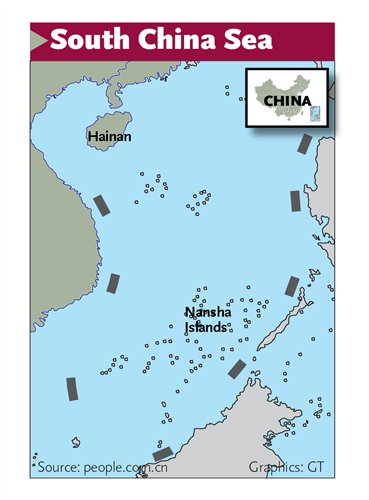
Spy plane in S. China Sea emboldens others: experts
China on Thursday urged the U.S. to respect its sovereignty and slammed the latest U.S. accusation that China's construction work in the South China Sea is undermining regional stability, after CNN reported that the Chinese navy asked a U.S. surveillance plane flying over the islands to leave.
The CNN report said that the Chinese navy on Wednesday asked a P8-A Poseidon, the most advanced U.S. surveillance aircraft, eight times to immediately leave as it swooped over some of the islets in Nansha Islands in the South China Sea.
Chinese foreign ministry spokesperson Hong Lei responded Thursday that he had no specific information on the encounter, and reiterated China's indisputable sovereignty over the Nansha Islands and surrounding waters, stressing China's right to monitor maritime and air situations to prevent incidents.
Hong strongly responded to remarks made by U.S. Deputy Secretary of State Antony Blinken on Wednesday during a conference in Jakarta that China's construction work "is eroding regional trust and undermining investor confidence.
"China is constructing on its territory to provide better services in areas including maritime rescue, disaster prevention and navigation safety to fulfill international obligations. It is peaceful and beneficial to the public. The groundless U.S. assumptions will not help resolve disputes or secure trust and stability in the region, but would only encourage some countries to take further provocative actions," he said.
"The U.S. should act in a prudent manner to play a constructive role on peace and stability in the region," Hong said. He urged the U.S. to keep its promise of not taking sides on territorial disputes.
U.S. military signals
The CNN report and Blinken's comments came amid increasing assertive calls from the U.S. over the South China Sea issue recently. Earlier, the Pentagon said it is considering sending U.S. military aircraft and ships to assert "freedom of navigation" in the South China Sea.
By displaying for the first time challenges from the Chinese navy of a U.S. aircraft to the public, the U.S. may try to neutralize the game, for example, after being criticized for its misjudgment toward the China-led Asian Infrastructure Investment Bank, Ni Feng, deputy director of the Institute of American Studies at the Chinese Academy of Social Sciences, told the Global Times.
"The U.S. may also be testing China's position over the issue to weigh its options in next month's Sino-U.S. strategic economic dialogue in Washington," he said.
The Chinese navy exercised restraint and gave proper warnings in line with international norms under the situation, while the U.S. was interfering using freedom of navigation as an excuse, a barrier that does not exist in the South China Sea, Zhang Junshe, a captain and research fellow at the Chinese Naval Research Institute, told the Global Times.
While the U.S. tried to bring up the issue during U.S. Secretary of State John Kerry's Beijing visit over the weekend, China arranged a series of meetings for him with senior leaders and reiterated its firm stance.
Before Kerry met Chinese President Xi Jinping, he said that recent U.S. media reports on the issue do not represent U.S. government decisions. During the meeting, the two leaders agreed that the general direction of the bilateral relationship will not be affected by disputes.
Facing the U.S. challenge, China's "salami tactic" of stepping forward piece by piece yet not responding with fierce military measures was effective, said Ni.
Unlikely conflict
Despite the increasing tension on the South China Sea issue, analysts believe that this encounter does not mean that the U.S. is initiating further conflicts.
"It is very unlikely that further conflicts, or even a 'war' as some U.S. experts claimed, will take place. China should stay calm and proceed with the construction and not be disturbed by U.S. assertions," Teng Jianqun, a research fellow at the China Institute of International Studies, told the Global Times.
There are voices in the U.S. who believe that Washington should take a step back in the South China Sea issue.
"It is one thing to make clear to Beijing that Washington will never countenance China transforming 80 percent of that area into Chinese territorial waters, it is quite another matter to implicitly back rival claimants and become a military participant in the underlying feuds. Yet the U.S. has already done the former and seems poised to do the latter," Ted Galen Carpenter, a senior fellow at U.S. think tank Cato Institute, wrote for the National Interest magazine on Monday.
However, there is limited room for both countries to step forward or back off. The U.S. would keep the issue heated, but the issue will not dominate the big picture of the new model of major-country relationships between China and the U.S., said Ni.
















































